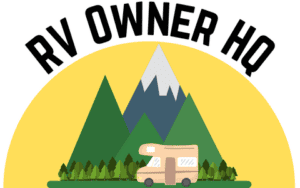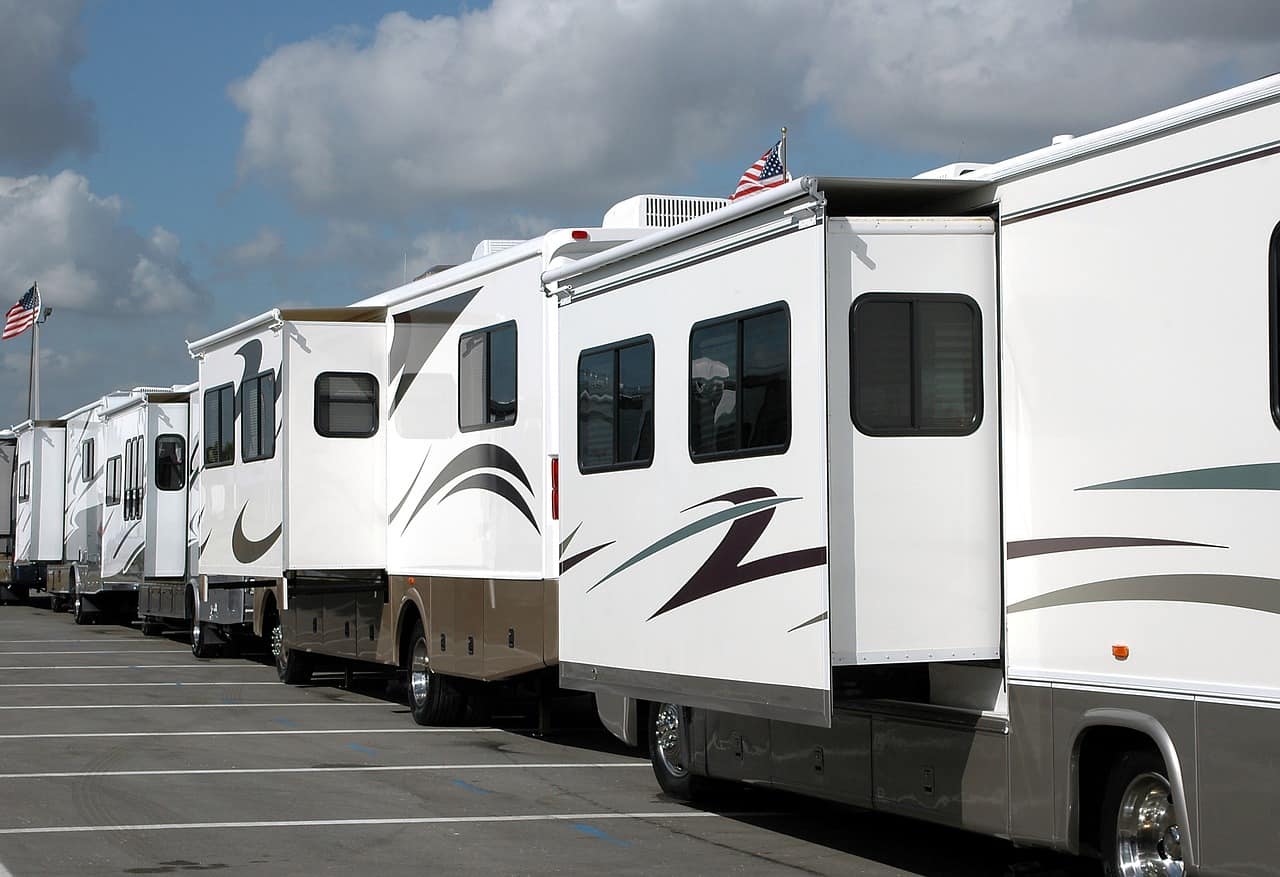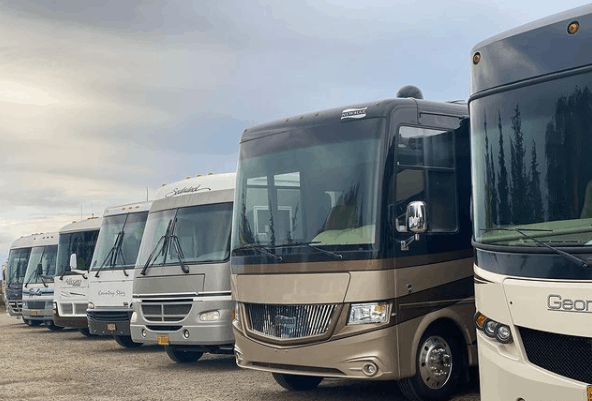If you’ve decided to buy a used RV as opposed to a new one, often one of the first questions you have is how much should I pay for a used RV?
After all, probably the biggest reason you are considering buying a used RV in the first place is to save money.
So how much should you pay for a used RV?
Well in this used RV buyer’s guide will be exploring not only this question but also how to get the best deal on a used RV, how to buy a used RV, as well as what to look out for when buying one.
Determining the Right Price For a Used RV
Let’s say you found that perfect used RV, that you can envision you and your family enjoying for years to come but how are you supposed to know what the RV is worth and how much you should pay for it.
With so many different types and classes of RVs on the market today, it can be challenging to know what the fair market value of a particular RV might be.
But it’s simpler than you might think.
How to Determine the Fair Market Value of a Used RV
Check the NADA Guide Price
The best place to determine the value of a used RV is the NADA guide, which most people find surprising because they assume it’s just for automobiles.
However, the NADA guide maintains values and pricing for all types of RVs including traveler trailers, fifth wheels, motorhomes, and pop-ups going back as far as 1966.
The NADA guide is pretty much the Kelly Blue Book for RV values.
The reason why the guide is so great is that the National Automobile Dealers Association uses multiple data points such as retail sales transactions, auction transactions, asking price information, as well as numerous macro and microeconomic factors to determine their values and pricing.
So when you find an RV you’re interested in, the first thing you want to do is come here to determine what NADA suggests the value of the used RV is.
While the NADA guide provides three prices including the suggested list price, low retail price, and average retail price.
The number you want to focus on is the average retail price as this number will most closely represent the true value of the RV.
Steps to Determine an RV’s Value on the NADA Guide Website
- Go to nada.com.
- Select the RV icon on the home page.
- Choose the type of RV you are trying to determine the RV for.
- Select the make of the RV from the drop-down menu.
- Select the specific year of the RV. (this is important because models can change from year to year)
- Then select the model from the list of hyperlinks.
- Input your zip code to get the most accurate value for your area.
- Then select base pricing without adding any additional features, as this will give you the most accurate value of the RV.
RV Depreciation and How it Affects the Price of Used RVs
One of the worst things about buying a new RV and one of the best things about buying a used RV is RV depreciation.
This is because RVs just like cars and trucks are a depreciating asset. And just like cars and trucks, this depreciation can often be substantial in the first few years.
So to get an idea of how much an RV depreciates, let’s take a look at an example of typical RV depreciation.
RV Depreciation
| Year 1 | 20% Off New Price |
| Year 2 | 25% Off New Price |
| Year 3 | 30% Off New Price |
| Year 4 | 35% Off New Price |
| Year 5 | 40% Off New Price |
| Year 10 | 50% Off New Price |
As you can see, RV depreciation is the most aggressive during the first few years and then tends to level off as the RV gets older.
Which is great news for RVers looking to save money buying a used RV as you can usually get anywhere from 25 to 30 percent off the RV when you buy one just a few years old.
What Factors Affect the Price of a Used RV?
There are many factors that affect the price of a used RV and its value including age, condition, type of RV, as well as its brand.
Age of the RV
The biggest factor that affects the price of a used RV is the age of the RV, but why do RVs lose their value as they get older?
The first reason is that RVs have an average lifespan of about 20 years so the older the RV gets the less usable life the RV has left which reduces its value.
The second reason is that travel trailers and especially motorhomes are mechanical nightmares filled with items that can be very expensive to repair or replace as they wear out and break over time.
The final reason why RVs lose their value as they age is that most buyers want the latest and greatest when it comes to RV styling and technology.
Because of this as an RV becomes more and more outdated, the buyers interested in the RV will be less and less which will reduce the RVs value over time.
Condition of the RV
The next biggest factor that affects the value of a used RV is the RV’s overall condition.
As it’s not uncommon for very similar RVs, where the only real difference is their condition, to have a price difference of several thousand dollars.
Type of RV
The type of the RV can also have a big impact on its value because the popularity of a certain type of RV can increase and decrease over time leading to fluctuations in its value.
For example, while larger RVs such as Class A motorhomes and large travel trailers are still popular, the excitement in the RV industry today is really around small travel trailers and Class B motorhomes.
As new RVers are entering the market looking for more fuel-efficient and easier to drive and tow RVs.
Causing the value of smaller RVs to increase and the value of larger RVs to decrease.
Brand
An RVs brand can have a big impact on its used value.
As more premium brands such as Airstream and Winnabego tend to hold their value better over time compared to more budget-friendly brands such as Forest River and Thor.
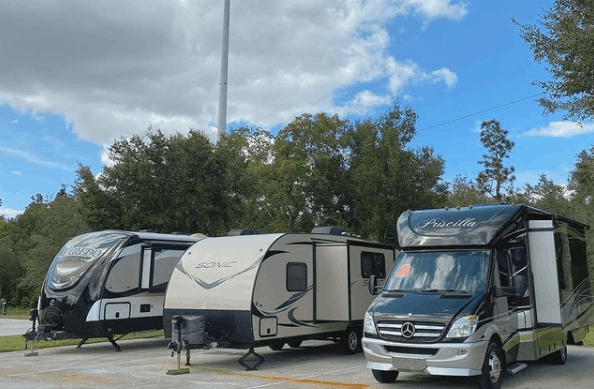
What You Should Know Before Buying a Used RV
Before you buy a used RV there are several things you should know in order to ensure you get the best deal possible and find the perfect RV for you and your family.
Is It Worth Buying a Used RV?
Yes, used RVs are definitely worth buying and are a great option for anyone looking to save money.
Saving money is not the only benefit of buying a used RV though as there are many benefits to buying a used RV over a new one.
- Avoid Most of the Early Depreciation – As we saw above, RVs tend to lose a lot of value in those first few years from depreciation. So if you buy a used RV a few years old you can avoid all that early major depreciation.
- Often Include Extra Accessories – When you buy a new RV it surprisingly comes with almost no accessories. However, used RVs often come with a variety of accessories purchased by the previous owner.
- Great for Beginners – Often the largest barrier to entry for most people wanting to get into RVing is the large upfront cost of a new RV. Which is why used RVs are so great for beginners because it allows them to get into RVing at a much lower price.
- Have More to Choose From – When buying a new RV you usually just have the current year’s model to look at which doesn’t provide a lot of choice or options. However, when you buy a used RV you often have years of RV inventory to look at and choose from.
If your looking for even more reasons why you should buy a used RV over a new one check out our article “14 Reasons to Buy a Used RV Over a New One“.
How Much Can You Negotiate on a Used RV?
The first thing you should know when buying a used or a new RV is that the list prices on RVs, especially at RV dealerships are extremely inflated and must be negotiated down in order to get the best deal.
But just how much can you negotiate off on the price of a used RV?
RV dealerships usually have a lot of room to negotiate on the price of a used RV because most of their used inventory was acquired very cheaply through customer trade-ins.
So when you are negotiating the price of a used RV use should be able to reduce the price of the RV by at least 20% if not more.
Depending on how long the dealership has had the RV and how badly they want to get rid of it.
How to Get the Best Price When Buying a Used RV
The first thing you need to do in order to get the best price on a used RV is to do your homework and know your numbers before you ever sit down at the negotiating table.
Because when all the numbers start flying around during negotiations, it’s very easy to get overwhelmed and confused unless you have a firm bottom-line number going in.
Also, while most RV buyers will finance their RV at the dealership through a bank the dealer has a relationship with.
You might want to consider bringing your own financing for the RV through a bank you have a personal relationship with, as you can often save a lot of money on fees and financing.
Bringing your own financing to the deal can also help you get a better deal on the RV as well.
Because you can focus solely on the bottom-line price of the RV and not have the distraction of RV financing worked into all the numbers.
As RV dealers often use the financing aspect of the deal to work in extra fees and costs.
The last thing you need to do to make sure you get the best deal is don’t be afraid to walk away.
The RV dealer or private seller needs to know that you are not married to this one RV and can certainly buy another RV instead.
Remember though when using this technique to use it subtly and only when needed or you can overplay your hand and burn the negotiations.
Where is the Best Place to Buy a Used RV?
There are two main places to buy a used RV including RV dealerships and private sellers and each one has its pros and cons.
So let’s take a look and see what the pros and cons are of these two main sources.
RV Dealership Pros
- Better Selection to Choose From – RV dealerships often have hundreds of RVs both new and used on their lot, giving you a wide variety of RVs to choose from.
- Pre-Sale Inspection – While not always the case, when you buy a used RV from a dealer, it usually goes through a pre-sale inspection to make sure everything is in working order. (However, you should always do your own independent inspection and not rely on the RV dealer’s inspection.)
- Easier to Finance – When buying a used RV, RV dealerships already have relationships with several banks that can provide the financing you need to purchase the RV.
- Warranties – While used RVs are sold in as-is condition on RV lots, many RV dealers will offer warranties or extended warranties when you buy the RV from them.
RV Dealership Cons
- High Turn Over in RVs Sales Industry – There is often a very high turnover rate in the RV sales industry. Which can often be a frustrating experience for customers because it’s not uncommon for the customer to know more about the RV than the salesperson who just started last week.
- Hidden or Extra Fees – RV dealerships will often add extra fees to the buying process which can add considerable cost to the RV.
- Pushy Salespeople – While there are certainly good RV dealers as well as RV salespeople. There are also a lot of RV salespeople that have a very short-term mindset when selling RVs and looking to make a quick buck, which can often cause a very poor buying experience for the customer.
Private Seller Pros
- Get to Talk With the Previous Owner – When you buy a used RV from a dealer, the history of the motorhome, and how well it was cared for in the past can be hard to know. But when you buy from a private seller you get to talk directly with the owner of the RV. And while you shouldn’t just take everything they say at their word, you can certainly get a feel of how well the RV has been cared for.
- Avoid Hidden and Extra Fees – Buying an RV from an individual allows you to avoid the costly fees often tacked on by RV dealers.
- Avoid RV Dealerships – Allows you to buy an RV in a much more simple and straightforward way, without all the high-pressure sales tactics and games that are sometimes used at RV dealerships.
Private Seller Cons
- Can Be More Expensive – As a general rule of thumb, you can usually get a better deal from a dealer than you can from a private seller when buying a used RV. This is because private sellers often have an unrealistic opinion on the price of their RV due to emotional attachment. Or due to the fact that the seller still owes a substantial amount on the RV and is trying to recoup some of their loss.
- No Warranties – When you buy a used RV from an individual or private seller you are buying the RV as-is with no warranties. So if something breaks on the RV right after you buy it, you’re out of luck.
- Have to Bring Your Own Financing – When dealing with private sellers, you will have to bring your own financing for the RV.
- Not All Private Seller’s are Trustworthy – While most sellers are pretty trustworthy, not all sellers are. And if you run into a bad one that is not honest about the RV or has covered up major defects, you could be left with a lemon or an RV that needs major and costly repairs. (Which is why you should always have an RV inspected.)
What is the Best Month to Buy a Used RV?
The best time to buy a used RV is during the off-season which typically starts in mid-November before the holidays and ends just before spring in late February.
In my opinion, though the absolute best month to buy a used RV is in the month of December if you’re looking for the best deal.
Because December is right in the middle of the off-season when RV dealers have very few customers due to the holiday season and the cold weather.
Making RVs dealers and salespeople much more willing to discount the RV and work with you to make the sale.
Best RV Brands to Buy Used?
When you’re looking for a quality used RV the brand of the RV definitely matters.
This is because the build quality can vary greatly from one RV brand to another, which can severely impact the long-term usability of the RV.
So when shopping for a used RV you want to look for premium brands of RVs as opposed to budget brands, as these premium brands will typically have better build quality and use better materials.
Best RV Brands to Buy Used
- Winnebago
- Airstream
- Tiffin
- Lance
- Northwood
- Jayco
- Entegra
How Do You Inspect a Used RV for Sale?
One of the most important things you need to do when buying a used RV is to thoroughly inspect the RV from top to bottom.
While it’s important to realize that no used RV or even new RV for that matter will be in perfect condition, during this inspection you want to make sure there are no major issues with the RV.
This inspection is critical to ensure you are buying a used RV that is in overall good condition and void of any major issues or defects that could be very costly to repair down the road.
Used RV Inspection Checklist
Structure
- Frame – Look under the RV to ensure the frame is straight and there are no major rust issues especially in northern climates prone to a lot of rain and snow.
- Axle – Inspect the axles of the RV to see if they appear to be in proper working order again with no rust issues. Also, when inspecting the axle you want to see a bit of an upward crown when the RV is unloaded. Because if the axle is crowned down it more than likely means the RV has been overloaded.
- Suspension – Check to make sure the suspension looks good and ensure nothing looks worn out or broken.
Water Damage
- Seals – Make sure you thoroughly inspect all the seals of the RV to see if they have been comprised or appear to be dry rotted or cracked. Paying special attention to the corners, around the windows and doors, and where the roof and walls come together.
- Gaskets – Inspect all gaskets around the RV especially around the slideouts to see if they are still flexible and working properly.
- Delamination – Delamination occurs when the fiberglass separates from the plywood walls of the RV and is usually a good indication of water damage. Delamination is pretty easy to spot as you will see a rippling or bubbling effect on the fiberglass.
- Exterior RV Walls – Inspect the RV walls by pressing on the walls to see if the wall has a solid feel like it should or if the wall feels soft or mushy which is a good indicator of water damage.
- Interior RV Walls – While checking the exterior RV walls is important you also want to check the interior walls to see if you see any signs of water damage. Making sure to thoroughly inspect all the walls including ones inside cabinets and wardrobes.
- Slides – Slides are often prone to water issues and leaking, so be sure to thoroughly inspect both the inside and outside of the slide looking for any signs of water damage.
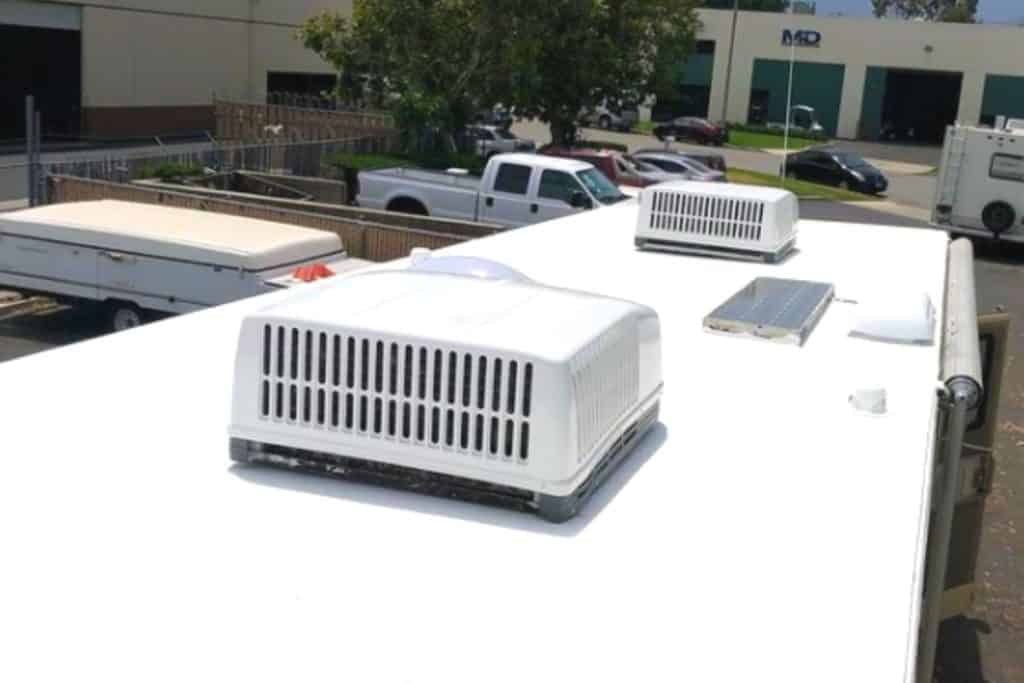 Roof
Roof
- Caulking and Seals – Thoroughly inspect the caulking and seals on the RV roof, as this is often the most likely place to have water intrusion on the RV. Make sure the calling and seals are all in good shape with no gaps or cracks.
- Rubber Roof – Unless you are buying an all-aluminum or fiberglass trailer, most RVs will have a rubber roof and you definitely want to thoroughly inspect the rubber roof to make sure it appears to be in good condition with no bubbling, dry rotting, or chunks missing.
Awning
- Make sure to fully inspect the awning, to ensure it functions properly and there are no tears or rips in the awning.
Tires
- Date Code – Check the date code on the RV tires to determine their age, as RV tires usually have a life expectancy between three to six years depending on how well they’ve been cared for and used.
- Side Walls – Make sure there is no major cracking or dry rot on the sidewalls of the tires.
- Tread – Look to make sure there is still plenty of usable tread on the tires and the wear is evenly distributed across the tire.
Mechanicals
- Heating and Cooling System – Check both the heating and cooling systems to make sure they function properly.
- Kitchen Appliances – Turn on all kitchen appliances to make sure they are functioning properly.
- Slides – Make sure the slides extend and retract smoothly
- Water Pump – Turn on the water pump to make sure it’s in proper working order.
- Water Heater – Ensure the water heater is producing hot water and doesn’t have any leaks.
Plumbing
- Tanks – Inspect the tanks on the exterior of the RV to ensure they are not leaking and don’t have any major dents or issues.
- Water Lines and Drains – Check all water lines and drains that are visible to ensure there are no leaks.
Electrical
- Outlets – Check all outlets and USB ports throughout the coach to ensure they are all working and that none of the GFCIs are tripped.
- Electrical Panel – Take a look at the panel to ensure all the breakers are working properly and there are no burnt or charred looking breakers that could indicate a past overload or electrical issue.
Engine and Breaks
- If you are buying an RV with an engine or its on independent breaks, take the RV to a qualified mechanic or independent RV dealership to have the engine, transmission, and brakes inspected.
- Generator – If the RV you are buying has a generator check the number of hours on the generator and have it inspected by a qualified mechanic to ensure it’s in proper working order.
How Old is too Old When it Comes to Used RVs?
While it might be tempting to buy a used RV that’s 20 years old or more due to its cheap price, this is typically not a good idea because you are basically buying an RV at the end of its physical life.
Because most RVs are built to last around 20 years.
Beyond that 20 year mark, you are much more likely to have major issues and problems with the RV that will often lead to very expensive repair bills.
So when buying a used RV it’s usually best to stick to RVs that are 10 years old or less, as these RVs can be bought at a good discount but still have plenty of life left in them.
Not to mention the fact that if you need to finance your used RV, most lenders and banks will not loan on an RV older than 10 years.
So if you buy an RV older than 10 years, you will have to pay cash for it.
Want to know how much you can negotiate on a used RV? If so, check out our article “How Much Can You Negotiate on a Used RV“.
Recent Posts
Picture this: you're parked at a scenic campsite, the great outdoors stretching out before you. You step outside your RV, ready to soak in the fresh air and beautiful views. But wait - something's...
Are you ready to hit the open road in your RV? Before you set off on your adventures, it's crucial to have the right RV travel tips and RV accessories up your sleeve. As a seasoned RVer, I've...
